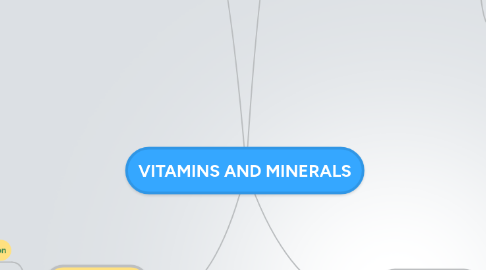
1. Fat-soluble Vitamins
1.1. Vitamin A (Retinol)
1.1.1. Needed for healthy vision and skin
1.1.2. Provides resistance against infections
1.1.3. Needed for growth and development
1.1.4. Acts as an antioxidant
1.2. Vitamin D (Cholecalciferol)
1.2.1. Helps to form strong bones and teeth
1.2.2. Helps the body to absorb calcium and phosphorus
1.3. Vitamin E (Tocopherol)
1.3.1. Acts as an antioxidant
1.3.2. For healthy nerves and muscles
1.4. Vitamin K (Naphthoquinone)
2. Trace minerals
2.1. Iron
2.1.1. Essential for the formation of haemoglobin and myoglobin
2.1.2. Required for cellular respiration
2.2. Iodine
2.2.1. Essential for the production of thyroxine
2.2.2. Promotes general growth and development of our body
3. Water-soluble Vitamins
3.1. Vitamin B1 (Thiamin)
3.1.1. Helps to break down food into energy
3.1.2. Needed for normal functioning of nerves
3.2. Vitamin B2 (Riboflavin)
3.2.1. Helps in the release of energy from food
3.2.2. Needed for growth and development
3.3. Vitamin B3 (Niacin)
3.3.1. Helps in the release of energy from carbohydrates and fats
3.4. Vitamin B6 (Pyridoxine)
3.4.1. Needed to produce and break down amino acids
3.5. Vitamin B9 (Folate/Folic acid)
3.5.1. Helps in the release of energy from amino acids
3.5.2. Helps to form new cells and genetic materials (DNA)
3.5.3. Works with vitamin B12 and iron to produce red blood cells
3.6. Vitamin B12 (Cobalamin)
3.6.1. Needed to form red blood cells
3.6.2. Needed for normal functioning of nerves
3.6.3. Needed to maintain the enzymes system
3.7. Vitamin C (Ascorbic acid)
3.7.1. Acts as an antioxidant
3.7.2. Needed to form proteins
3.7.3. Helps the body to absorb iron from cereals and dark green vegetables
4. Major minerals
4.1. Calcium
4.1.1. Works with phosphorus and vitamin D to build bones and teeth
4.1.2. Needed for normal blood clotting
4.1.3. Needed for muscular and nerve functions
4.2. Potassium
4.2.1. Works with sodium to regulate fluid movement in and out of body cells
4.2.2. Essential for muscle development and nerve functions
4.3. Phosphorus
4.3.1. Works with calcium and vitamin D to build and maintain bones and teeth
4.3.2. Required for the conversion of carbohydrates and fats into energy
4.3.3. Helps maintain fluid balance in our body
4.4. Sodium chloride
4.4.1. Chloride required for the production of hydrochloric acid in the stomach
4.4.2. Sodium allows the control of nerves and muscles
4.4.3. Sodium and chloride regulate fluid in our body
